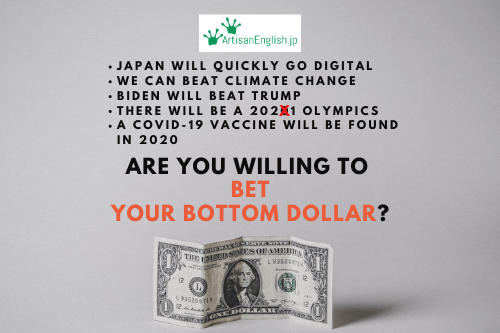
YouTube / iTunes / Spotify / Radio Public / Pocket Casts / Google Podcasts / Breaker / Overcast
Listen to ArtisanEnglish.jp posts & lesson intros here.
Phrase: Bet your bottom dollar
I’m not a betting man, but when the Japanese government approved Integrated Resorts (IR) with gambling casinos, I told my wife she could bet her bottom dollar there would be corruption and scandal.
Well, there are no IRs yet, but the corruption and scandal are here all the same.
On Christmas Day 2019, Tsukasa Akimoto was arrested on suspicion of taking bribes.
That means he’s guilty.
The Japanese police do not go after high-ranking officials or politicians every day.
If the police arrest a lawmaker in Japan, they already have enough evidence to convict him.
The scandal has continued to grow since then, and you can bet your bottom dollar it will get worse – and this is just the beginning.
If someone uses the phrase bet your bottom dollar, it’s a sign that they are sure what they say will happen is going to happen.
They are so sure they are willing to stake everything they have on it.
In other words, they are eager to put their money where their mouth is.
This is not a phrase North Americans use lightly.
People enjoy heated debates and discussions much more than the Japanese do.
We also believe in the courage of our convictions.
That’s why I’m not willing to bet my bottom dollar on Japan going digital, humans beating climate change, Biden defeating Trump, a 2021 Olympics or a COVID-19 vaccine being discovered this year.
The outcomes for all of these things are up in the air.
The one thing I am willing to guarantee is that unless Japan trashes its plans for Integrated Resorts, there’s going to be more scandals, bribery and arrests.
Tsukasa Akimoto is just the beginning.
You can bet your bottom dollar on it.
Flesch-Kincaid Readability Test
This post is understandable by someone with at least an 8th-grade education (age 13 – 14).
On the Flesch-Kincaid reading-ease test, this post scores 67.
The easier a passage is to read, the higher the score on a scale of 0 – 100.

